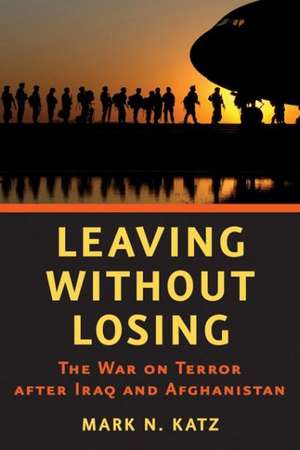Leaving without Losing – The War on Terror after Iraq and Afghanistan
Autor Mark N. Katzen Limba Engleză Paperback – 7 oct 2013
Drawing lessons from the Cold War, Katz makes the case that rather than signaling the decline of American power and influence, removing military forces from Afghanistan and Iraq puts the U.S. in a better position to counter the forces of radical Islam and ultimately win the war on terror. He explains that since both wars will likely remain intractable, for Washington to remain heavily involved in either is counter-productive. Katz argues that looking to its Cold War experience would help the U.S. find better strategies for employing America's scarce resources to deal with its adversaries now. This means that, although leaving Afghanistan and Iraq may well appear to be a victory for America's opponents in the short term--as was the case when the U.S. withdrew from Indochina--the larger battle with militant Islam can be won only by refocusing foreign and military policy away from these two quagmires.
This sober, objective assessment of what went wrong in the U.S.-led wars in Afghanistan and Iraq and the ways the West can disentangle itself and still move forward draws striking parallels with the Cold War. Anyone concerned with the future of the War on Terror will find Katz's argument highly thought provoking.
Preț: 205.91 lei
Nou
Puncte Express: 309
Preț estimativ în valută:
39.40€ • 41.25$ • 32.60£
39.40€ • 41.25$ • 32.60£
Carte tipărită la comandă
Livrare economică 05-19 aprilie
Preluare comenzi: 021 569.72.76
Specificații
ISBN-13: 9781421411835
ISBN-10: 1421411830
Pagini: 168
Dimensiuni: 155 x 227 x 14 mm
Greutate: 0.23 kg
Editura: Johns Hopkins University Press
ISBN-10: 1421411830
Pagini: 168
Dimensiuni: 155 x 227 x 14 mm
Greutate: 0.23 kg
Editura: Johns Hopkins University Press
Textul de pe ultima copertă
Drawing lessons from the Cold War, Mark N. Katz makes the case that, rather than signaling the decline of American power and influence, the removal of military forces from Afghanistan and Iraq puts the U.S. in a better position to counter the forces of radical Islam. He explains that, since both wars will likely remain intractable, for Washington to remain heavily involved in either is counter-productive. Katz argues that looking to its Cold War experience will help the U.S. find better strategies for employing America's scarce resources to deal with its adversaries now. Although leaving Afghanistan and Iraq may appear to be a victory for America's opponents in the short term--as was the case when the U.S. withdrew from Indochina--the larger battle with militant Islam can be won only by refocusing foreign and military policy away from these two quagmires.
"Katz offers a strong, cogent argument."--Choice
"This slender volume is packed with many insights. A collection of short chapters, some not much longer than op-eds, reveals author Mark Katz's wisdom and prudence when it comes to the use of military power and the need for patience and persistence when pursuing long-term objectives... His straightforward prose engages the reader in what often feels like a quiet one-on-one conversation... The book is suffused with a tone of welcome optimism, but not naivete."--Christopher Preble, Middle East Policy
"As the U.S. searches for a way forward, Katz's largely objective and thoughtful analysis offers much to consider."--Publishers Weekly
"Katz makes a concise and readable argument for why withdrawal from Iraq and Afghanistan will serve to weaken the forces of radical Islam, and along the way provides a trenchant critique of the uses to which American power has been put over the past decade."--Francis Fukuyama, Stanford University
"Katz offers a strong, cogent argument."--Choice
"This slender volume is packed with many insights. A collection of short chapters, some not much longer than op-eds, reveals author Mark Katz's wisdom and prudence when it comes to the use of military power and the need for patience and persistence when pursuing long-term objectives... His straightforward prose engages the reader in what often feels like a quiet one-on-one conversation... The book is suffused with a tone of welcome optimism, but not naivete."--Christopher Preble, Middle East Policy
"As the U.S. searches for a way forward, Katz's largely objective and thoughtful analysis offers much to consider."--Publishers Weekly
"Katz makes a concise and readable argument for why withdrawal from Iraq and Afghanistan will serve to weaken the forces of radical Islam, and along the way provides a trenchant critique of the uses to which American power has been put over the past decade."--Francis Fukuyama, Stanford University
Notă biografică
Descriere
Anyone concerned with the future of the War on Terror will find Katz's argument highly thought provoking.
